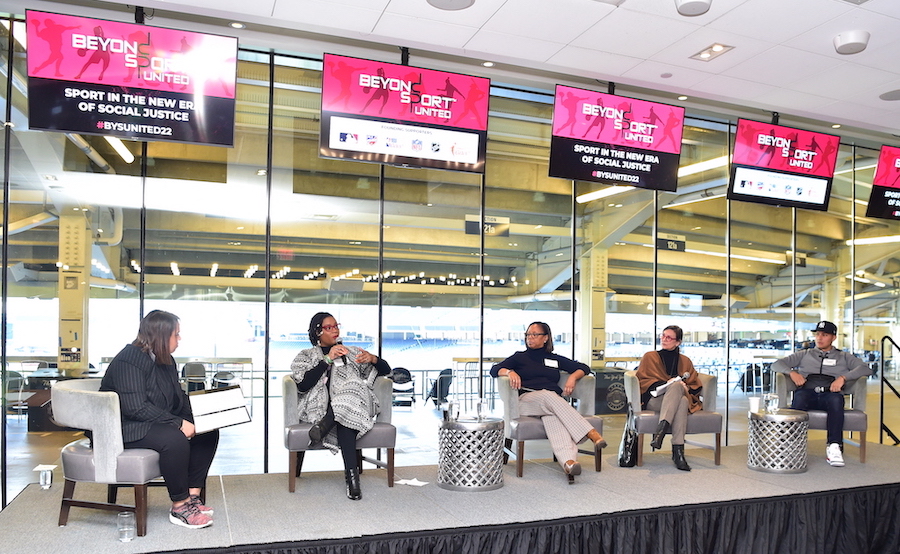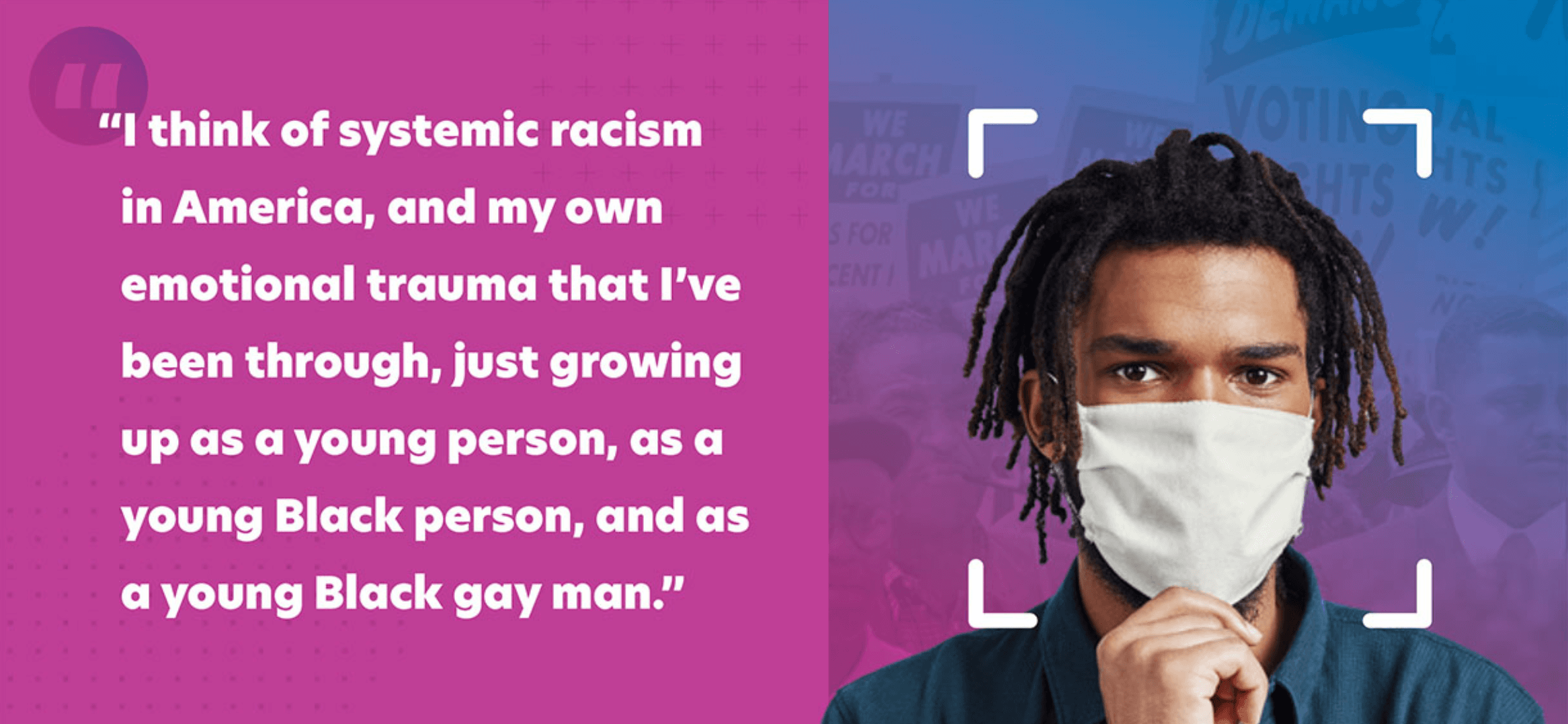
#Return2Play Fund in Focus: Our Q&A with Dr. Monica Ponder
February 17, 2023
In recognition of February's celebration of Black History Month in the US and the recent release of the Return to Play Fund PSA produced by our founding partner, ESPN, and its accompanying resources, this month we are speaking with members of our Return to Play Fund Expert Advisory Council. Members shared their insights and expertise in diversity, equity, inclusion, public health and sports as we developed the Fund to help ensure that Black and Brown youth in the US are not further disadvantaged post-pandemic.
Today, we’re featuring Dr. Monica L. Ponder PhD, MS, MSPH, Assistant Professor of Health Communication and Culture in the Department of Communication, Culture and Media Studies within the Cathy Hughes School of Communication at Washington, D.C.'s Howard University. Her research addresses organization-level approaches to public health and crisis communication practice, particularly those centering a Black feminist lens. Dr. Ponder focuses on providing communications solutions to understand, reach and engage historically marginalized and racialized groups during public health emergencies. Her goal is to ultimately advance traditional health communication practice into one that centers cultural perspectives and environmental context in its design.
Dr. Ponder spoke to us about expanding public health crises communications to address marginalized and racialized communities, what sports entities can do to address health outcomes and much more:

The 2023 Black History Month theme is "Black Resistance: highlighting how Black Americans have fought against racial inequality." As a scholar-activist, can you tell us about your work at the intersection of public health and crisis communications to address disparities in the US healthcare system surrounding historically marginalized and racialized groups?
This theme is so appropriate for Black History Month and beyond. The fight for social progress and health equity is continual. As a public health scholar, I work primarily in crisis communications with a core understanding that, due to racism, health inequities and historical harm, some communities are in a constant state of crisis. The ways in which we support them and respond during emergencies should reflect this reality. My research seeks to understand and encourage communities to become their own best advocates, support the critical work of ethnic media and citizen journalists in amplifying our stories and help public health institutions to listen in a culturally responsive manner.
As a public health specialist on the Fund's Expert Advisory Council, what role do you feel sports can play in the pursuit of racial equality in our communities?
The Return to Play Fund is a valuable public health intervention for a myriad of reasons. Teaching young people to play and engage in spaces including and beyond competitive contexts allows opportunities for social engagement, interpersonal learnings and community connectedness. These are critical skills for human development that serve us throughout our lifetime. Second, the timeliness of the Return to Play Fund comes after a national period of social distancing, trauma and anxiety due to COVID-19 prevention measures and spread. Providing access to activities that can address the social and emotional needs of children and youth during the pandemic is a critical need.
At Beyond Sport United 2022, which focused on sport’s heightened role in social justice advocacy, you stated that we should be putting play and rest in crisis response kits – could you explain what you mean by this and the benefits for physical and mental health?
This is an important aspect of my scholarship. As I mentioned, our approach to public health crisis communications must be expanded in order to address the needs of historically marginalized and racialized communities. It is my hope that, in times of future public health crises (including environmental disasters, health epidemics and social unrest), any local, state and federal public health response includes funding and related support for play for community connection, storytelling and other adaptive forms of public engagement, healing and coping. These are necessary public health interventions too – just as important as the ones we have grown accustomed to hearing, like vaccines, mask-wearing, etc.

Your Project REFOCUS program examines the factors that impact the health of populations that have been historically marginalized. What do you feel are the top factors and their impacts?
[Editor's note: Dr. Ponder is the co-principal investigator of Project REFOCUS (Racial Ethnic Framing of Community-Informed and Unifying Surveillance) - a real-time crisis monitoring system and educational resources for public health practitioners. The tools can be used to observe and address social stigma and support historically marginalized and disproportionately affected populations during public health crises like the COVID-19 pandemic.]
As a part of Project REFOCUS, we partnered with six communities (listed below). The most consistent factors that are contributing to local-level crises and a sense of unrest are related to social determinants of health, like housing (gentrification), medical racism and harms related to policing and surveillance. We have also observed that social stigma and racism – both interpersonal and structural - affect the mental and physical health of many Americans, preventing them from attaining their highest level of health.
- The University of Arkansas for Medical Sciences, Lincoln, Arkansas
- The Phoebe Putney Health System, Albany, Georgia
- Wayne State University, Detroit, Michigan
- Urban Health Plan (Borough of the Bronx), New York, New York
- Shaw University, Wake County, North Carolina
- The University of Texas at San Antonio, San Antonio, Texas

In your opinion, what are the key areas that need to be addressed for the healthcare system to treat Black and Brown communities fairly?
Our nation’s healthcare system needs to be held accountable for the historical harms that have contributed to the high levels of mistrust and distrust among Black and Brown communities. Further, the adaptation of culturally responsive patient care and engagement is an urgent priority. There is promising momentum in the support and training of patient advocates, community health workers, doulas, etc. who represent the needs of patients and communities. Healthcare providers must also consider culturally-valued ways of healing and holistic health – without judgment – within patient care plans.
What strategies or steps do you feel sport entities can take to address the health outcomes in the communities they serve – especially in predominantly marginalized communities?
The Return to Play fund and sports entities have opportunities to influence outcomes in two areas: education and practice. In terms of education, sports entities can be strategic in underscoring in messaging and promotions that activities, like play, contribute significantly to collective mental health and physical well-being. In terms of practice, these groups are trusted voices that also facilitate experiences of safety and play – both competitively and for community connectedness. How can this critical work be expanded and more accessible to community members? There is much opportunity here and synergy with public health goals.
Learn more about the Return to Play Fund and how you can get involved. Parents and guardians, young people and coaches and youth sport providers, please take advantage of the Return to Play Funds free digital resources - provided by Council members and other trusted sources - to help navigate a healthy and equitable return to play.